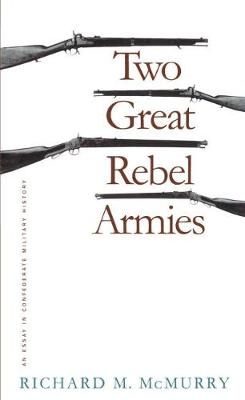Civil War America
1 total work
Richard McMurry compares the two largest Confederate armies, assessing why Lee's Army of Northern Virginia was more successful than the Army of Tennessee. His bold conclusion is that Lee's army was a better army--not just one with a better high command.
""Sheds new light on how the South lost the Civil War.""--American Historical Review
""McMurry's mastery of the literature is impressive, and his clear and succinct writing style is a pleasure to read. . . . Comparison of the two great rebel armies offers valuable insights into the difficulties of the South's military situation.""--Maryland Historian
|In Engines of Innovation, Holden Thorp and Buck Goldstein make the case for the pivotal role of research universities as agents of societal change. They argue that universities must use their vast intellectual and financial resources to confront global challenges such as climate change, extreme poverty, childhood diseases, and an impending worldwide shortage of clean water. They provide not only an urgent call to action but also a practical guide for our nation's leading institutions to make the most of the opportunities available to be major players in solving the world's biggest problems. A preface and a new chapter by the authors address recent developments, including innovative licensing strategies, developments in online education, and the value of arts and sciences in an entrepreneurial society.
""Sheds new light on how the South lost the Civil War.""--American Historical Review
""McMurry's mastery of the literature is impressive, and his clear and succinct writing style is a pleasure to read. . . . Comparison of the two great rebel armies offers valuable insights into the difficulties of the South's military situation.""--Maryland Historian
|In Engines of Innovation, Holden Thorp and Buck Goldstein make the case for the pivotal role of research universities as agents of societal change. They argue that universities must use their vast intellectual and financial resources to confront global challenges such as climate change, extreme poverty, childhood diseases, and an impending worldwide shortage of clean water. They provide not only an urgent call to action but also a practical guide for our nation's leading institutions to make the most of the opportunities available to be major players in solving the world's biggest problems. A preface and a new chapter by the authors address recent developments, including innovative licensing strategies, developments in online education, and the value of arts and sciences in an entrepreneurial society.
